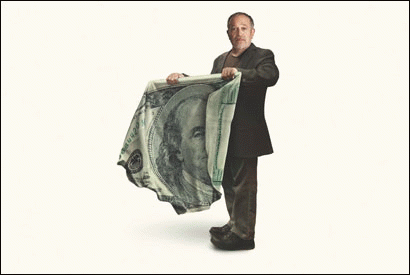What's the economic issue we should focus on -- jobs, or inequality? An increasing number of people, including the President and New York's new mayor, have suggested that inequality of wealth and opportunity is the defining issue of our time.
But some of the folks at the Washington Post's "WonkBlog" are having none of it. First editor Ezra Klein declared that unemployment, not inequality, should be the left's defining issue. That drew responses from the likes of Paul Krugman and Jared Bernstein (and yours truly, here).
Bright Future
Then Dylan Matthews, a staff reporter on the team (and creator of the highly addictive "Knowmore" site) used a hypothetical scenario to challenge the importance of inequality. Matthews took to a platform called "TwitLonger" (which, parenthetically, looks a lot like something we used to call a "blog") to argue that people who consider inequality our society's defining issue "really think the gap between the rich and poor, separate from the actual positions of the rich and poor on their own, is the problem."
Matthews imagines a future America where poverty, hunger, and homelessness are eliminated; unemployment's below 4 percent; and GDP and median wages keep growing. If you think inequality's the problem, says Matthews, you won't be satisfied.
"If that sounds preposterous," writes Matthews, "then maybe it's because you don't actually think inequality is our biggest problem. You think something like poverty or joblessness or median wage stagnation is. And you're right."
False Choice
But that's a false choice. It won't be possible to achieve anything close to that scenario without addressing today's sky-high inequality. And while it's theoretically possible to imagine an economy which experiences both extreme inequality and healthy GDP growth, it's not possible to imagine this economy growing that way.
Here's why: Unemployment, under-employment, and long-term wage stagnation are suppressing consumer demand. That demand is the engine of a growing and healthy economy -- one which is not overly dependent on "rentier" income (see Bob Kuttner here for more on rentiers), bubbles, or cost-inflated financial transactions for its growth, as ours currently is.
Higher tax rates for the wealthy and corporations -- that is, returning them to something approaching historical levels -- provides much of the revenue for programs which fight poverty and enhance social mobility, as well as for those which lead to job creation and wage growth. It's not an "either/or" between reducing inequality and increasing employment or reducing poverty; it's "and/and."
Seeds of Chaos
Klein argues otherwise on job creation, writing that "We've had nearly full employment during periods of high inequality (say, 2005) and we've had high unemployment during periods of relative equality (say, 1982)."
But other recessionary forces were at work in 1982. Employment levels were good in 2005, thanks to a series of bubbles (the housing bubble was inflating rapidly that year). But job creation was relatively weak during that decade, even before the crisis of 2008.
What's more, that decade, like the one which preceded it, was laying the groundwork for today's ongoing crisis with massive financialization of the economy, which included mass speculation and fraud; growing wage stagnation for the middle class; and increasing loss of social mobility. Celebrating 2005 employment statistics is like celebrating the pre-iceberg Titanic for its nautical safety.
Not Inequality Only
That's not to say that the Klein/Matthews argument is entirely without merit. We shouldn't focus exclusively on inequality, especially if we haven't reached consensus on its origins or its relationship to today's other economic problems. But there appears to be plenty of consensus about these things in the Bernstein/Krugman crowd, to which I subscribe, and I'd paraphrase that consensus view as follows:
Inequality is the result of economic forces such as increased financial speculation, financialization of economic profits, deregulation, trade policy, tax breaks, and other government policies which favor the wealthy and corporate interests. These forces have also led to today's high levels of unemployment and poverty.
(Note: You can view every article as one long page if you sign up as an Advocate Member, or higher).






